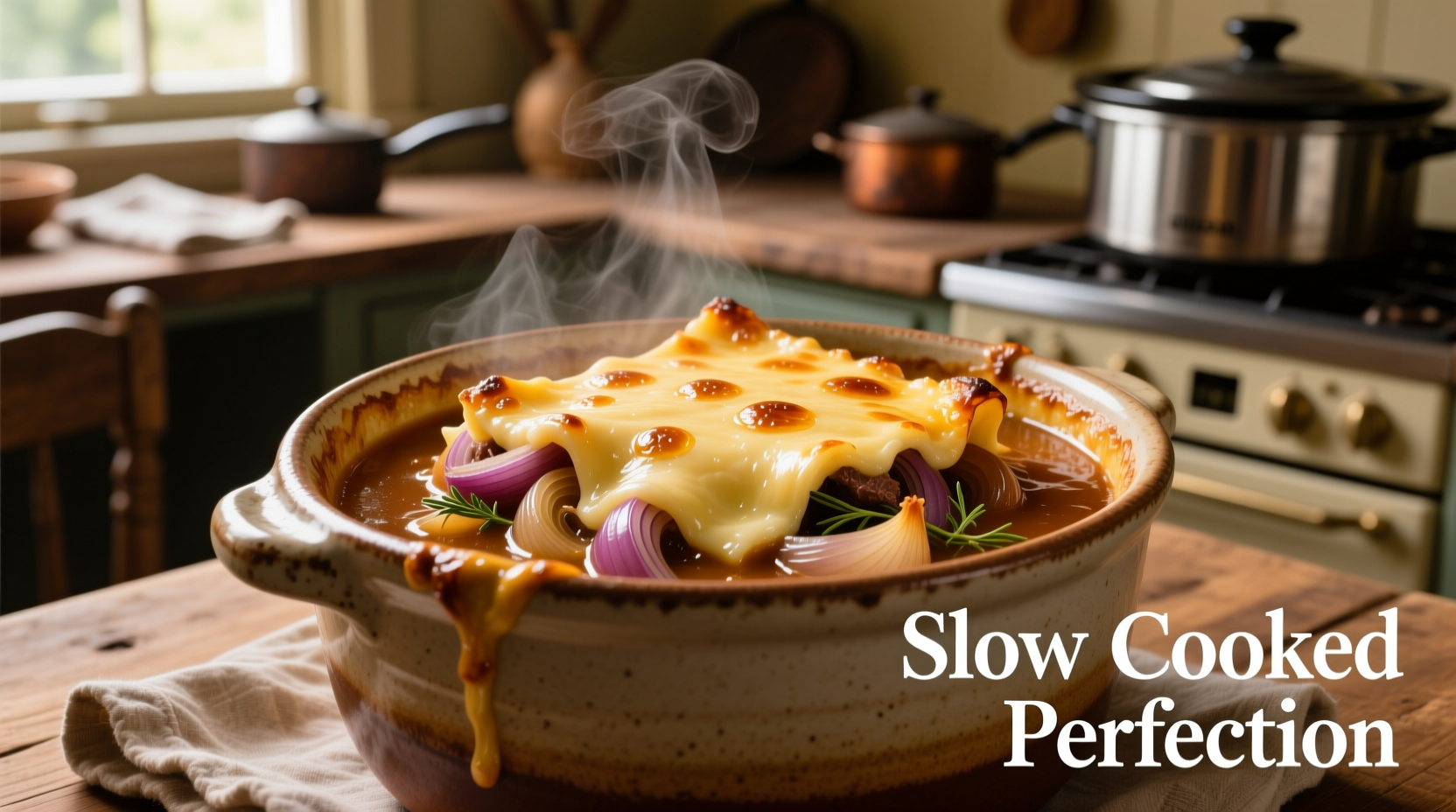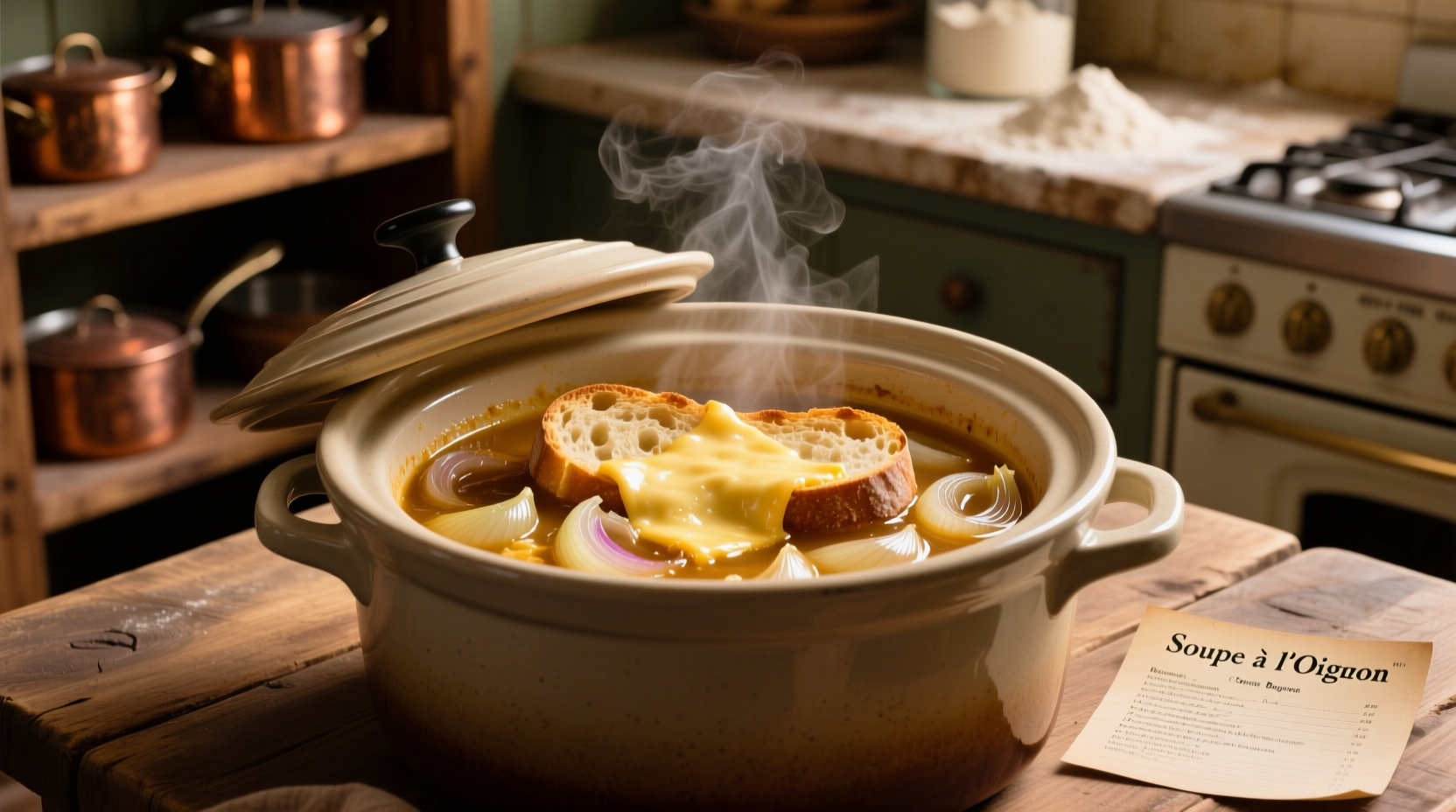French onion soup traditionally demands hours of careful onion caramelization and broth simmering. But with this slow cooker method featuring roast beef, you'll achieve restaurant-quality results with minimal effort. The extended cooking time in a slow cooker actually enhances flavor development while freeing you from constant stove supervision.
The Slow Cooker Advantage for French Onion Soup
While purists might argue French onion soup requires stovetop attention, modern slow cookers offer surprising benefits for this classic dish. The consistent low temperature (typically 170-280°F) allows onions to caramelize gradually without burning—a common challenge with traditional methods. According to the America's Test Kitchen research, slow, steady heat produces more complex flavor compounds than high-heat stovetop caramelization.
| Method | Active Time | Total Time | Flavor Development | Consistency |
|---|---|---|---|---|
| Traditional Stovetop | 60-90 minutes | 2-3 hours | Rich but variable | Requires constant attention |
| Slow Cooker with Roast | 25-30 minutes | 6-8 hours | Deeper, more consistent | Hands-off perfection |
This comparison shows why the slow cooker method with roast beef works exceptionally well for busy home cooks seeking authentic results without the traditional time commitment.
Essential Ingredients Breakdown
The magic of French onion soup lies in its simplicity—just a few quality ingredients working in harmony. When using a slow cooker with roast beef, ingredient selection becomes even more critical:
- Onions: Use 4-5 pounds of yellow onions (8-10 medium). Avoid sweet varieties like Vidalia which become overly saccharine during long cooking.
- Roast Beef: 1 pound of chuck roast provides ideal marbling and connective tissue that breaks down into rich gelatin.
- Liquid Base: Combine 4 cups beef broth with 1 cup dry white wine (like Sauvignon Blanc) for balanced acidity.
- Aromatics: Fresh thyme (3 sprigs), bay leaf (1), and garlic (2 cloves) build foundational flavors.

Step-by-Step Cooking Process
Follow these professional techniques to maximize flavor in your slow cooker French onion soup with roast:
- Prepare onions: Slice uniformly (⅛ inch thick) using a mandoline for consistency. Uneven slices lead to inconsistent caramelization.
- Dry roast beef: Pat chuck roast dry and sear on all sides in hot oil (4 minutes per side) to develop Maillard reaction flavors.
- Caramelize onions: Cook onions with 2 tbsp butter and 1 tsp sugar over medium heat for 15-20 minutes until golden—this initial stovetop step is crucial before transferring to slow cooker.
- Layer flavors: Place seared roast on bottom of slow cooker, add caramelized onions, wine, broth, and aromatics.
- Cook low and slow: Set slow cooker to LOW for 6-8 hours (not HIGH, which can make onions mushy).
- Finish properly: Remove roast, shred meat, return to soup. Discard bay leaf and thyme stems before serving.
Contextual Considerations for Success
While this slow cooker French onion soup with roast method works beautifully in most situations, understand these important context boundaries:
- Not for last-minute meals: The slow cooker method requires planning ahead—ideal for weekend cooking or meal prep.
- Appliance matters: Models with precise temperature control (like those with digital thermostats) yield more consistent results than basic analog models.
- Broth quality is critical: When using a slow cooker, flavors concentrate differently—always use low-sodium broth you'd drink plain.
- Wine selection impact: The alcohol cooks off, but the wine's acidity remains—avoid oaky wines which can turn bitter during long cooking.
Troubleshooting Common Issues
Even with this simplified method, occasional challenges arise. Here's how to fix them:
- Soup too sweet: Balance with 1 tsp apple cider vinegar and additional salt. Overly sweet onions often result from cooking on HIGH setting.
- Lacking depth: Add 1 tbsp soy sauce or 2 tsp mushroom powder—these umami boosters work wonders in slow cooker preparations.
- Broth too thin: Remove 2 cups of liquid, simmer separately until reduced by half, then return to slow cooker.
- Meat too dry: This indicates overcooking—shred roast immediately after cooking and return to broth to reabsorb moisture.
Serving Like a Parisian Bistro
For authentic presentation of your slow cooker French onion soup with roast:
- Ladle hot soup into oven-safe bowls
- Float 1-2 slices of baguette on top
- Cover generously with Gruyère cheese (not Swiss—authentic recipes specify Gruyère)
- Broil until golden and bubbly (2-3 minutes)
- Serve immediately with a sprinkle of fresh thyme
For the best experience, enjoy your French onion soup slow cooker roast creation within 24 hours of preparation. The flavors continue developing in the refrigerator, but the bread topping is best added fresh.











 浙公网安备
33010002000092号
浙公网安备
33010002000092号 浙B2-20120091-4
浙B2-20120091-4